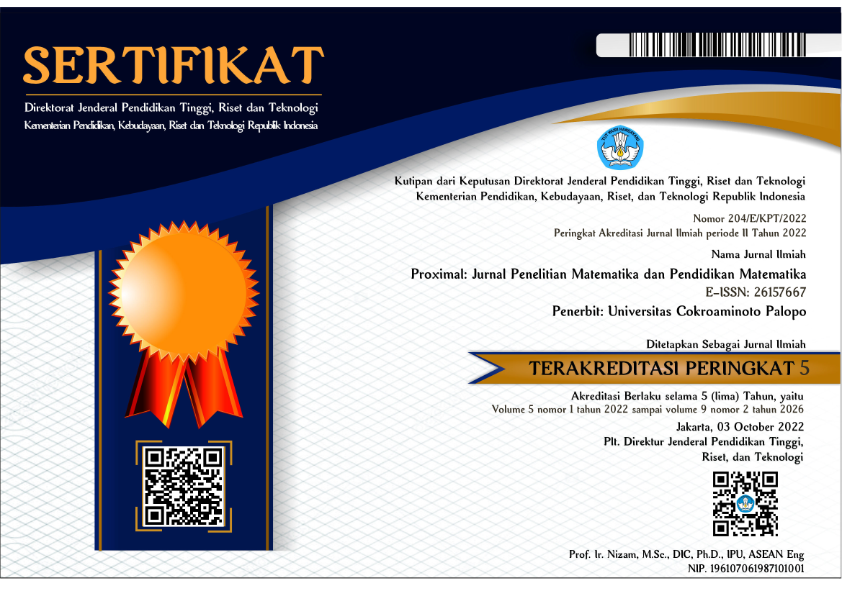Ethnomathematical Practices and Agricultural Timing in Bugis Culture
DOI:
https://doi.org/10.30605/proximal.v8i1.5370Keywords:
Ethnomathematics, Bugis Traditions, Cultural Calendar, Auspicious Days, Agricultural TimingAbstract
This study delves into the realm of ethnomathematics within the Bugis culture, specifically examining how good and bad days for farming are determined. Utilizing a descriptive qualitative approach, the research involved direct observations at Fort Rotterdam, Makassar, alongside extensive literature reviews. The findings indicate that the division of good and bad days is based on distinct time cycles, represented by unique symbols that denote the quality of time. These traditions, passed down through generations, provide insights into the cultural values and beliefs of the Bugis community regarding the optimal timing for various activities. The symbols and guidelines not only embody cultural heritage but also illustrate the interplay between traditional time concepts and mathematical principles, such as patterns in calendar calculations. In Bugis culture, time is more than just the passage of hours—it is a living guide that intertwines spirituality with daily life. Terms like Empty, Dead, Alive, Even, and Full are imbued with profound meanings that influence their actions, ensuring harmony with natural and spiritual rhythms. The traditional time-scoring system maintains balance, but skipping intervals like midday or afternoon can significantly alter the day's designation. Analyzing daily scores and excluded intervals highlights how time segments impact activities and symbolism, with Wednesday and Saturday deemed particularly suitable for farming.
Downloads
References
Gunawan, F. (2018). Guidelines symbol of good days and bad days of the Bugis community of Kendari City. Kendari.
Jumarni, & Junaeda, S. (2024). Mattanra Esso: Day calculation system in Alluppangnge community of Corawali Village, Barru Regency. Essentials Of Inspirational Education, 592-602.
Koentjaraningrat (1995) Peoples and cultures in Indonesia; Workshop: Business Culture Interaction in Indonesia, March 15-16,1995. Jakarta: World Trade Center Jakarta, 33 pp.
Nurhazmah, S. (2022). Cultural identity and traditions in South Sulawesi: The Bugis community. Journal of Ethnological Studies, 23(4), 567-589.
Nurul Resky Ridhayanti. (2023). The Tolaki Calendar System For Determining Good And Bad Days. Al-Hilal: Journal of Islamic Astronomy, 5(1).
Sukirman, N., Nuraisyah, & Wakia, N. (2022). Analisis Penanggalan Sistem Dua Puluh Hari dalam Satu Pekan pada Penentuan Hari Baik dan Buruk di Kab. Pinrang Perspektif Ilmu Falak. Hisabuna: Jurnal Ilmu Falak, 3, 83-100.
Sukmawati, R. S. (2022). Analysis of the good days and bad days in the Bugis calendar perspective astronomy. Journal of UIN Alauddin.
Reski, S., Rasywan Syarif, & Shippah Chotban. (2022). Analisis terhadap hari baik dan hari buruk dalam sistem penanggalan kalender suku bugis perspektif ilmu falak. Hisabuna: Jurnal Ilmu Falak, 3(1), 1-16. https://doi.org/10.24252/hisabuna.v3i1.25030
Putra, A. (2022). The Bugis Lontara Calendar in Islamic Perspective: A dating system used to determine good days and bad days in the Bugis tribe. Proceeding International Conference on Sharia and Law, Surabaya, August 4, 2022. https://proceedings.uinsa.ac.id/index.php/ICOSLAW/article/view/948/965
Downloads
Published
How to Cite
Issue
Section
License
In submitting the manuscript to the journal, the authors certify that:
- They are authorized by their co-authors to enter into these arrangements.
- The work described has not been formally published before, except in the form of an abstract or as part of a published lecture, review, thesis, or overlay journal.
- That it is not under consideration for publication elsewhere,
- That its publication has been approved by all the author(s) and by the responsible authorities – tacitly or explicitly – of the institutes where the work has been carried out.
- They secure the right to reproduce any material that has already been published or copyrighted elsewhere.
- They agree to the following license and copyright agreement.
License and Copyright Agreement
Authors who publish with this journal agree to the following terms:
- Authors retain copyright and grant the journal right of first publication with the work simultaneously licensed under Creative Commons Attribution License (CC BY 4.0) that allows others to share the work with an acknowledgment of the work's authorship and initial publication in this journal.
- Authors are able to enter into separate, additional contractual arrangements for the non-exclusive distribution of the journal's published version of the work (e.g., post it to an institutional repository or publish it in a book), with an acknowledgment of its initial publication in this journal.
- Authors are permitted and encouraged to post their work online (e.g., in institutional repositories or on their website) prior to and during the submission process, as it can lead to productive exchanges, as well as earlier and greater citation of published work.















